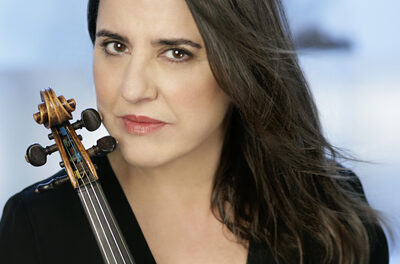One of the best aspects of life at a university is the weaving together of different disciplines and presenting alternate ways to view a work of art. With its enormous wealth of liberal arts departments and their cooperation with each other, Duke University is a great practitioner of this concept. In a very special concert at Baldwin Auditorium, the Department of Music, in association with the Franklin Humanities Institute presented Project Orfeo, a merging of music, literature, history, and an examination of a nearly unimaginable atrocity.
The subtitle on the program sums it all up quite nicely: “A concert of words and music inspired by Richard Powers‘ Orfeo.” Powers is an award-winning novelist as well as an accomplished musician proficient on several instruments. He writes, both fictionally and reality based, about the intersection of nature, technology, music and ancient civilizations in a fascinating amalgam of what is and what can never be. Orfeo (I have not yet read it), tells the story of American composer and geneticist Peter Els, but also includes a lengthy section describing the genesis and performance of Olivier Messiaen’s Quartet for the End of Time. A performance of this monumental work, along with Powers reading excerpts from his book, was the primary focus of the performance.
First up was Scott Lindroth, professor of music and provost for the arts at Duke University, as we heard the North Carolina premiere of his “Cadences” for sextet. The performers were clarinetist Benjamin Fingland, flutist Laura Gilbert, violist Jonathan Bagg, and the Horszowski Trio (violinist Jesse Mills, cellist Raman Ramakrishnan, and pianist Rieko Aizawa). Lindroth based this work, in part, on the linguistic patterns of Orfeo and Powers recited a brief introduction, which basically boiled down to a plea to listen closely and intently.
The work began with a great deal of difficult rhythmic asymmetry – deftly handled by the ensemble – which eventually smoothed out like a finely tuned-up car. Hearing a brand new work and writing a fair, objective critique is a difficult task without a repeated hearing. This is not a work that I’d search out to listen to again, but that does not imply any real failings. While it may be construed as faint praise, I found nothing overtly objectionable. Compelling rhythmic alterations was its strong point, and I did become engaged in its creative orchestration of the six instruments.
The background and story of the events surrounding the composition and first performance of the great French composer Olivier Messiaen’s greatest work, Quartet for the End of Time, is one that nearly every knowledgeable musician knows. Captured by the Germans in June of 1940 and sent to a camp in what is now Zgorzelec, Poland, Messiaen appealed to the little that was left of the humanity of the Germans (their love and respect for great music) to allow himself to compose, organize and rehearse a chamber work right in the midst of outrageous and unprecedented cruelty. Along with other musicians/prisoners, clarinetist Henri Akoka, violinist Jean le Boulaire and cellist Etienne Pasquier, as well as Messiaen as pianist, premiered this remarkable work on January 15, 1941, performing in an icy rain on decrepit instruments.
The performance at Duke was a unique and emotional event called “For the End of Time” which included an ongoing narrative by Powers interspersed between the eight movements of Quatuor Pour la fin du Temps.
It is often asserted that absolute music is its own language – that it says what cannot be put into words and it can and should stand on its own. While I believe that is generally true, once in a while a writer is able to enhance and amplify the emotional impact of great music with great linguistic skills as well as reverence for and experience with the music. Powers sat quite still, stage right on a stool, as he beautifully intoned passages from his book. Joining him were the members of the Horszowski Trio, plus the brilliant clarinetist Fingland.
More than just a narrator serving as a tour guide and pointing out snippets of interesting musical passages, Powers was an integral and equal partner for this special collaboration. He has a soft but passionate voice that added a measure of profundity and almost other worldliness to a story that is singular in music history. With a text describing Messiaen’s capture to the violin’s rapturous ascending climb into nothingness at the end of the work, one almost had a visceral experience of mind-numbing hunger, frigid temperatures, and other unnamable horrors.
Messiaen, as well as Powers, places emphasis on rhythm and the author, both in Orfeo and in his remarks, again placed rhythm not only as musically, but spiritually of paramount importance and as a metaphor for the war and life in the camp.
The quartet of musicians was magnificent technically as well as conveying the mystery of time itself, which is the center of this work. Each one had at least one movement in which he/she was the soloist, and they all carried it off with finesse as they transcended the enormous technical demands and reached a place deep within all of us.












